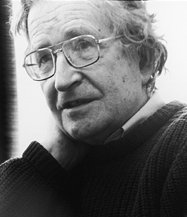 Readers of this blog will be interested in a web-exclusive interview with Noam Chomsky now available on our homepage. Did you know that Chomsky has a painting of Oscar Romero in the corner of his office at MIT? Nicholas Haggerty, a Fordham undergraduate and editorial intern at Commonweal, begins the interview by asking Chomsky about that painting. It turns out that Romero is one of many Catholics Chomsky has come to admire over the years.
Readers of this blog will be interested in a web-exclusive interview with Noam Chomsky now available on our homepage. Did you know that Chomsky has a painting of Oscar Romero in the corner of his office at MIT? Nicholas Haggerty, a Fordham undergraduate and editorial intern at Commonweal, begins the interview by asking Chomsky about that painting. It turns out that Romero is one of many Catholics Chomsky has come to admire over the years.
NH: You’ve often spoken reverently about the Latin American church. Yet, in Michael Gondry’s film Is the Man Who Is Tall Happy?, you mention harboring a deep fear of Catholics growing up in Philadelphia. Was there a person or event that changed that for you?
NC: I began to change in the early 1960s, when I started getting to know people on the Catholic left like Dan Berrigan and Dorothy Day—really wonderful people. And then I went to Central America a couple of times. One of my closest friends was the rector of UCA—the Jesuit University in Nicaragua—César Jerez. He had a leading position in the church in Guatemala, but he was forced to flee when the Guatemalans announced that they were going to kill all the Jesuits. All the Jesuits were pulled out of the country, and he went to El Salvador. He was an educated person. Archbishop Romero was kind of a peasant—a very honest, decent person, but with little education. Jerez became his house intellectual. Remember the famous letter that the archbishop sent to President Carter, urging him not to provide support to the government junta? Jerez wrote it. Something extremely interesting happened then. I haven’t been able to write about it because there is no documentation. Jerez told me that he wrote the letter for Romero, and that the day the letter arrived in Washington, he got a call from the Vatican. Apparently, the Carter administration had asked the Vatican to call off this troublesome priest. They knew what he was doing. Jerez was asked to go to Rome right away. He went to Rome and met with the head of the Jesuit order, who asked him what he was doing. He told him, and got support to continue. He got an audience with the pope. Jerez said the pope was kind of noncommittal. He didn’t say stop and he didn’t say go on, so Jerez took that to be authorization to continue. He went back to San Salvador and a few days later Romero was murdered. Jerez then had to flee to Nicaragua. In fact, when I was visiting Nicaragua, I used to stay at the Jesuit house. It was quite a change.
NH: You grew up reading the Hebrew Scriptures, and you’ve said Amos was your favorite prophet. Are you inspired by the prophets in issuing your warnings about the existential threats of nuclear and environmental disaster?
NC: That’s too much self-glorification. What’s translated in English as “prophet” doesn’t mean prophet. It basically means intellectual. They were what we would call dissident intellectuals. Amos says, “I am not a prophet. I am not the son of a prophet. I’m a simple shepherd and farmer.” He was distancing himself from what we would call the intellectual elite, and speaking for the people very eloquently. Jeremiah, of course, was not treated nicely for his pleas for mercy and justice. But that’s typical. The people we call the prophets I think are the earliest dissident intellectuals, and they’re treated like most dissident intellectuals—very badly. They’re imprisoned, driven into the desert. King Ahab, the epitome of evil in the Bible, condemned Elijah as a “hater of Israel.” This is the first self-hating Jew, the origin of the term. It goes right up to the present. That’s the history of intellectuals. Most of them are false prophets, flatterers of the court. The real prophets are the exception and treated badly. How badly they’re treated depends on the society. Like in Eastern Europe, they were treated very badly. In Latin American, they were slaughtered.
Read the rest of the interview here.

